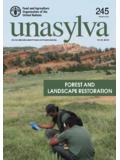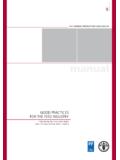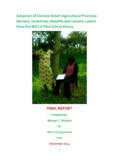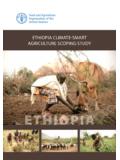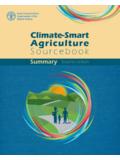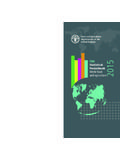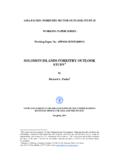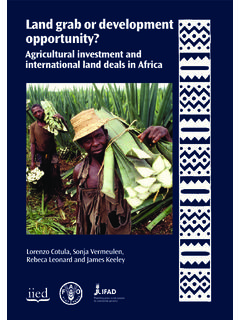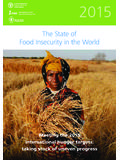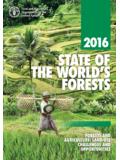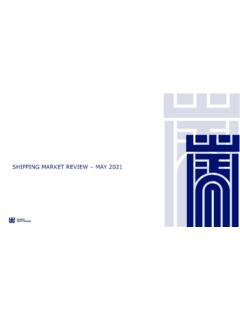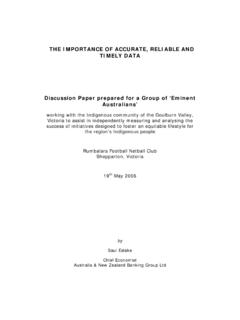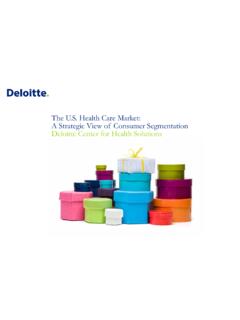Transcription of Smallholder Agriculture and Market Participation
1 Smallholder Agriculture andmarket participationNigel PooleSmallholder Agriculture and Market ParticipationPraise for this book Poole swims against the tide of meta-analysis, thematic review and non- differentiation. In this new work he embraces Sen s livelihoods entitlement framework anew and re-affirms people as central to Market inclusion. For students of the successes and failures of agricultural markets as a tool to meet global development goals he provides cogent argument, up to date references and important guidance for practice. Ben Bennett, Deputy Director of the Natural Resources Institute and Professor of International Trade and Marketing Economics at the University of GreenwichSmallholder Agriculture and Market ParticipationNigel PoolePublished by Food and Agriculture Organization of the United Nations and Practical Action Publishing 2017 Practical Action Publishing LtdThe Schumacher Centre, Bourton on Dunsmore, Rugby, Warwickshire, CV23 9QZ, FAO, 2017 The authors have asserted their rights under the Copyright Designs and Patents Act 1988 to be identified as authors of this work.
2 Such assertions shall not be construed as constituting a waiver of the privileges or immunities of rights reserved. No part of this publication may be commercially reprinted or reproduced or utilized in any form or by any electronic, mechanical, or other means, now known or hereafter invented, or in any information storage or retrieval system, without the written permission of the publishers. Product or corporate names may be trademarks or registered trademarks, and are used only for identification and explanation without intent to catalogue record for this book is available from the British catalogue record for this book has been requested from the Library of 978-1-85339-941-1 PaperbackISBN 978-1-85339-940-4 HardbackISBN 978-1-78044-941-8 ebookISBN 978-1-78044-940-1 Library pdfCitation: Poole, N.
3 (2017) Smallholder Agriculture and Market Participation , Rugby, UK: Practical Action Publishing, < >Since 1974, Practical Action Publishing has published and disseminated books and information in support of international development work throughout the world. Practical Action Publishing is a trading name of Practical Action Publishing Ltd (Company Reg. No. 1159018), the wholly owned publishing company of Practical Action. Practical Action Publishing trades only in support of its parent charity objectives and any profits are covenanted back to Practical Action (Charity Reg. No. 247257, Group VAT Registration No. 880 9924 76).FAO encourages the use, reproduction and dissemination of material in this information product. Except where otherwise indicated, material may be copied, downloaded and printed for private study, research and teaching purposes, or for use in non-commercial products or services, provided that appropriate acknowledgement of FAO as the source and copyright holder is given and that FAO s endorsement of users views, products or services is not implied in any way.
4 All requests for translation and adaptation rights, and for resale and other commercial use rights should be addressed to or to information products are available on the FAO website ( ) and can be purchased through ISBN 978-92-5-109939-1 The designations employed and the presentation of material in this information product do not imply the expression of any opinion whatsoever on the part of the Food and Agriculture Organization of the United Nations (FAO) concerning the legal or development status of any country, territory, city or area or of its authorities, or concerning the delimitation of its frontiers or boundaries. The mention of specific companies or products of manufacturers, whether or not these have been patented, does not imply that these have been endorsed or recommended by FAO in preference to others of a similar nature that are not mentioned.
5 The views expressed in this information product are those of the author(s) and do not necessarily reflect the views or policies of FAO, or of Practical Action Publishing Ltd or its parent charity Practical Action. Reasonable efforts have been made to publish reliable data and information, but the authors and publisher cannot assume responsibility for the validity of all materials or for the consequences of their design: Andrew CorbettCover photo shows small-scale cassava traders awaiting business in an urban Market , northern Zambia. Credit: the by vPrompt eServices, IndiaPrinted in the United Kingdom by Short Run Press LtdContentsAbout the author ixPart I The potential and challenges of Smallholder Agriculture 11. Introducing Smallholder Agriculture 3 The significance of Smallholder Agriculture 3 The contribution of agricultural development to reducing hunger and poverty 8 Challenges in fostering agricultural entrepreneurship 12 Commercializing Agriculture 16 The limitations of agricultural development for poverty reduction 25 A note on terminology 27 About the book 292.
6 Policy approaches and theoretical considerations 35 Changing policies: from Market systems to value chains 35 Theoretical approaches to households, markets, and marketing for the poor 42 Transaction costs 45 Households and livelihoods 48 Value chain thinking 533. Financial services for agricultural smallholders 65 Background 65 Finance and transaction costs 68 Financial innovations for farming 734. Risk management for agricultural smallholders 81 Introduction 81 Assessing risk in rural value chains 83 Risk management 87 Agricultural insurance for agricultural development 97 Economic risk and types of value chains 101 Conclusions 110 Smallholder Agriculture ANd Market PArticiPAtiONPart II Case studies of Smallholder Agriculture 1155. Introduction to Part II: Assessing the impact of commodity development projects on Smallholder Participation in agricultural markets: Case studies from Ethiopia, Peru, Tanzania, and Zambia 117 Introduction 117 Cases 118 Research approach and framework 121 Methodology 124 Summary of lessons learned 1266.
7 A diversification programme for vegetable exports in Ethiopia 129 Project context 129 Findings 131 Conclusions 1367. Production and commercialization of oilseeds in Peru 139 Project context 139 Findings 140 Conclusions 1458. Sisal product and Market development in Tanzania 149 Project context 149 Findings 150 Conclusions 1549. Strengthening the productivity and competitiveness of Smallholder dairying in Zambia 157 Project design and implementation 157 Project context 157 Findings 159 Conclusions 16210. Assessing the impact of projects on Smallholder Participation in agricultural markets: Synthesis and conclusions 165 Recapitulating the theory of change: expected relationships 165 Lessons learned 166 Conclusions 17811.
8 Postscript: Going local with development policies 183 Feeding the world 183 A macro perspective 185 A sectoral perspective 186 Policy interventions and tensions of scale: going micro 188 Index 193 cONteNtS viiAbout the authorNigel Poole originally trained in natural sciences at the University of Nottingham and in agricultural extension at the University of Reading, UK. He began working in overseas Agriculture in Swaziland and then moved to Paraguay in South America for 11 years, where some of his best days were spent being a cowboy.
9 He returned to the UK and switched into socioeco-nomics, studying for Masters and PhD degrees in agricultural economics at Wye College, University of London. Since 2007 he has worked in the Centre for Development, Environment and Policy at SOAS, University of London, where he is Professor of International Development. He has research experience in diverse countries in Latin America, the Mediterranean Basin, Sub-Saharan Africa and South and South-east Asia. His teaching is mainly in marketing, business and knowledge management. He is currently researching agrifood and nutrition value chain linkages with the DFID-funded multi-institutional research programme Leveraging Agriculture for Nutrition in South Asia (LANSA) covering Bangladesh, India, Pakistan and Afghanistan ( ).
10 He is leading the Afghanistan Working Group and the agrifood-nutrition value chain studies in the overall is also Chairman of the Board of Directors, CATIE (Centro Agron mico Tropical de Investigaci n y Ense anza/Centre for Tropical Agricultural Research and Teaching), Costa Rica. In his spare time, among other things, he is Chairman of a small charity, the Wye and Brook India Trust (registered charity number 288217), supporting schooling in Delhi, IThe potential and challenges of Smallholder agricultureCHAPTER 1 Introducing Smallholder agricultureThis introductory chapter discusses the importance of Smallholder Agriculture for economic development, poverty reduction, and livelihood enhancement in developing note that Agriculture is an occupation as well as an economic enterprise, and that women are much involved throughout the developing world.
